Time Does Not Dim the Camaraderie We Shared. Don’t Dwell on the Bad Stuff.
In early 1968 I left school, married, got drafted, and entered the Army. A job as a clerk interested me, but after flunking the typing test during basic training (nice try, but eight words a minute?) I ended up in Infantry Advanced Individual Training at Fort Lewis, Washington.
The weather and terrain of Washington state are similar to Germany and Korea, and having trained in the cold mountains, it only made sense that my next duty station would be somewhere with snow. Having grown up in Florida, I was really looking forward to learning more about snow.
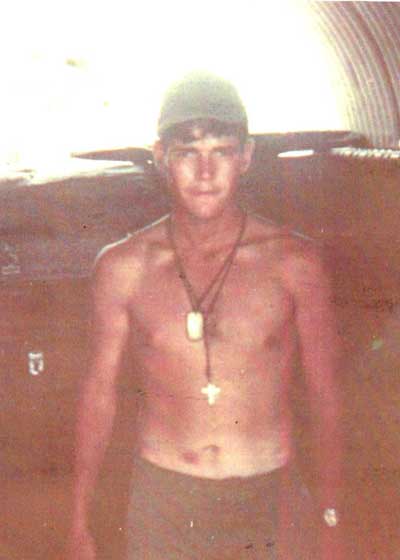
Jerry Lyons still often thinks of his time in Vietnam, more than five decades later. Photo courtesy of the author.
I got my orders and green underwear on the last day of Advanced Individual Training and headed to Vietnam as a replacement. The orders were as permanent as the underwear was temporary. I was destined to carry a real gun with real bullets in a hot place. To be in a line infantry unit during a real war. To learn to survive my year as a grunt, ground-pounder, 11-bravo, 11-bush, 11-ant bite, 11-jungle rot soldier. I had no idea at the time that I would someday be inclined to insert the word “proud” before each of these terms of endearment.
A 19- or 20-year-old grows up quickly in a war. As a combat infantryman, I experienced my share of boredom, terror, stress, waste, bullshit, and confusion. I observed the different ways people handled each of these, and I came up with a plan. It came down to this: Stay alert. Do things right. Have faith. And don’t dwell on the bad stuff.
I was assigned to the 199th Light Infantry Brigade (3rd Platoon, Alpha Company, 3/7th Infantry), which had excellent leadership most of the time. That applies to the company officers and noncommissioned officers and, just as importantly, the seasoned veterans of the platoon. I tried to understand the ways of these strange dudes. Before long, I became one of them.
We operated in the Mekong Delta area during most of my tour. One of the major contributors to our unit’s casualties was the Viet Cong booby trap—the improvised explosive device of that war. An unsuspecting GI on patrol often snagged a tripwire attached to a grenade (ours or theirs), claymore mine, or artillery round. Our grenades had a 15-meter “kill radius,” so you can imagine the damage it could do.
“Spread out! One round will get you all!” was the theme of the day.
The bigger the explosive, the more serious the casualties. I once saw the X-ray of one GI who got hit with a homemade Viet Cong booby trap. I had worked at a lumber yard the year before and recognized the sixpenny common nails in his back. He and I later joked about it.
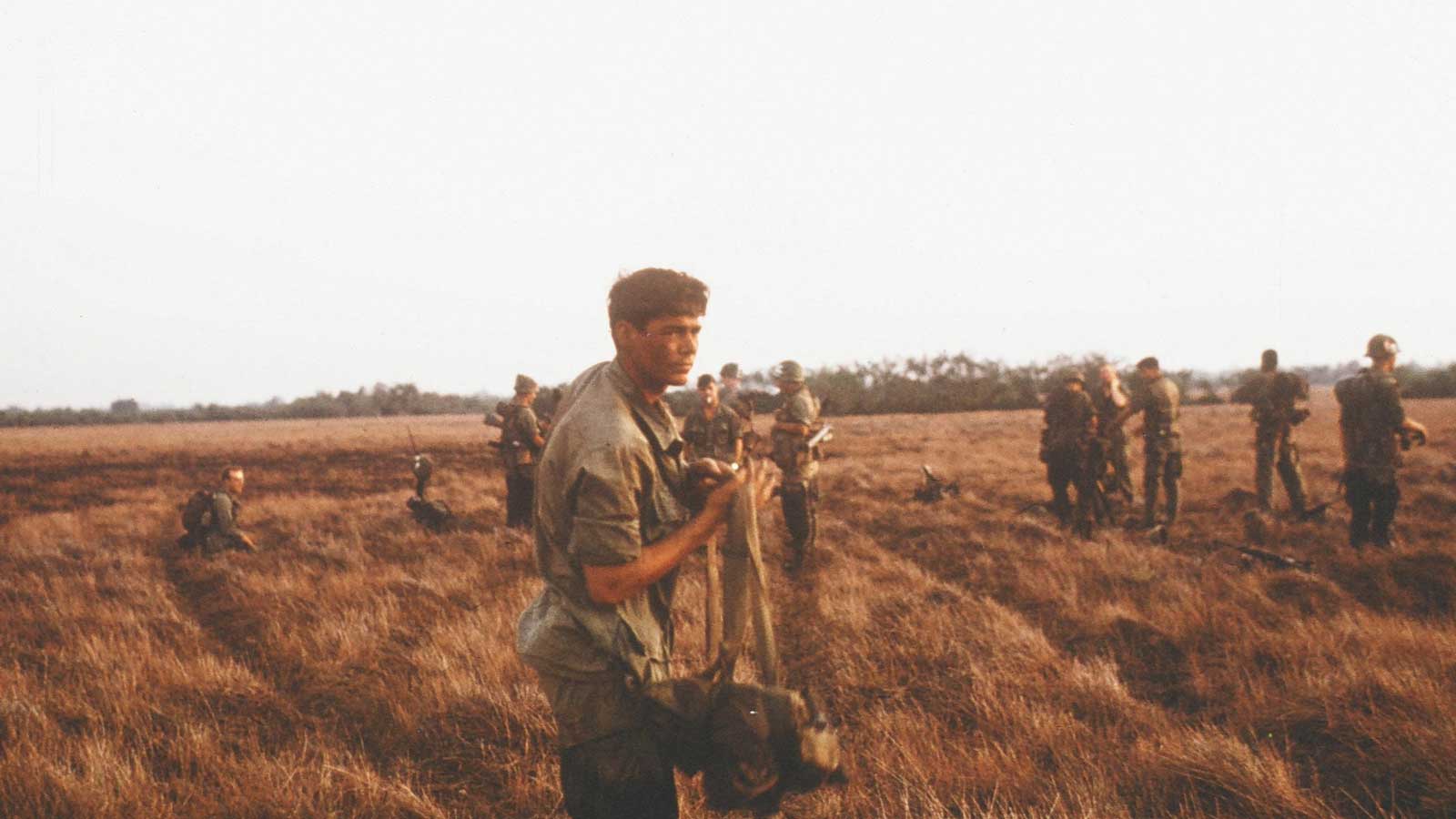
Jerry Lyons left school in 1968 and was soon drafted into the Army and sent to Vietnam. He made a plan: Stay alert. Do things right. Have faith. And don’t dwell on the bad stuff. Photo courtesy of the author.
We did not joke about more serious injuries, of which there were far too many.
It was frustrating, to say the least, that the enemy soldiers responsible were usually nowhere to be found when the damage was done. Sometimes they used command-detonated mines, targeted at vehicles or groups that did not heed the advice to spread out.
Eventually, I volunteered as my squad’s point man to have more control over our operations’ pace of movement. It was a bonus that I could also give up that heavy ammo can—everyone but the point man and the medic carried an ammo can for the squad’s M-60 machine gun. Two selfish reasons, I confess.
Award-Winning Journalism in Your Inbox
I grew somewhat competent in my new role, but not without some close calls. On Christmas Day 1968, I stepped on a grenade placed in the mud for an unsuspecting American GI. The pin was pulled; the handle should have flown off and set the fuse when I kicked it. But the mud had dried, and the handle didn’t move.
Thank God for dry weather.
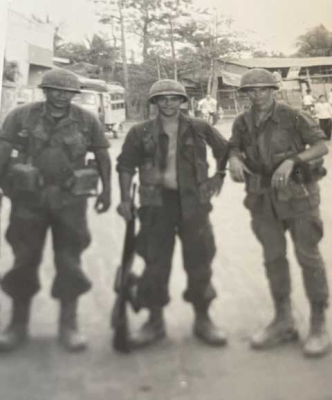
Jerry Lyons, right, on patrol in a village in Vietnam. Photo courtesy of the author.
I got to watch and learn from the best point man around—Tyrus Becker. Before he went home, Becker instructed at—and possibly started—the Brigade Booby Trap School. He was that good.
During a company-sized operation in a pineapple grove southwest of Saigon one morning, Becker spotted a trip wire caught on my flak jacket zipper. I hadn’t noticed the thin monofilament fishing line until he told me to freeze. Had he not seen it, the booby-trapped artillery round at the other end would have done major harm to more than just me. I learned to see these things as he did. My survival depended on it.
As I eventually got “short”—near the end of my tour—the Army gave me one of those good jobs, much better than what I’d grown accustomed to in the Third Platoon. As a forward resupply sergeant, I kept troops supplied with C rations, ammo, water, and mail. I officially made the rank of buck sergeant just before I left Vietnam.
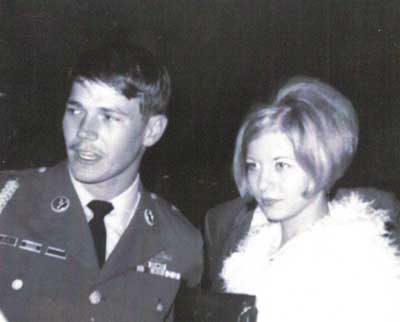
Jerry Lyons reunites with his wife, Janet, at the airport after a year in Vietnam. Photo courtesy of the author.
As a newly minted E-5, I could take my wife to my next duty station at Uncle Sam’s expense. I spent the final six months of my two-year active duty commitment playing war games at Fort Riley. During that time, the Army repaired my right knee, a preexisting, football-connected injury aggravated by rice paddy mud-humpin’. That 1970 repair lasted about 50 years. Who said you can’t trust Army doctors? Lucked out again!
After my military service ended, I proceeded to get on with my life. Of course, I had no idea how the events in Vietnam would shape my life years later. With the help of post-war scholarly focus—and the GI Bill—college seemed more important the second time around. I graduated and began an enjoyable career that is just now winding down. I’m still married to the same faithful wife. We have three grown sons and three wonderful grandchildren.
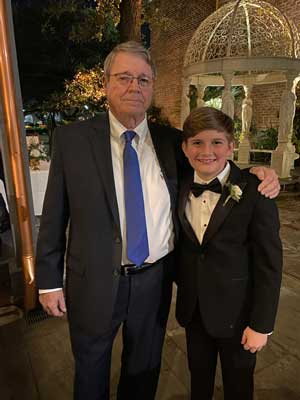
Jerry Lyons at his granddaughter’s wedding. Photo courtesy of the author.
Then there’s the Army. I guess I’d like to say, “It’s what I did, not who I am.” I read that quote years ago on another grunt’s website. As good as it sounds, I don’t think it applies to me. Fifty-three years later, “Vietnam veteran” is a big part of who I am.
Few days pass when my mind doesn’t return to something I learned during that year in the sun, mud, and rain. Not necessarily the bad stuff, because, as I said, I try not to dwell on that. But the people, places, and experiences of that year still linger in my thoughts, and probably always will.
I still try to keep a positive outlook. A realistic view, but with a focus on the good stuff. I’m not always successful, but I don’t stay off track for too long. If that technique can work in a war zone, it has a chance to work with many everyday problems—work, marriage, children, family.
Award-Winning Journalism in Your Inbox
The internet made it possible to reconnect with some of the people I shared that year with in the boonies, jungles, and firebase bunkers. Our Always Alpha group has reunions all over the country. Back in Vietnam, I never imagined we’d have the opportunity, or that I would be interested more than five decades later. Yet I look forward to every one.
Time has not dimmed the camaraderie we shared. The stories flow like water—or should I say beer? I’m reminded of many things I had forgotten. Some are good. Some are bad. But I count my blessings. I don’t dwell on the bad stuff.





Comments are closed.